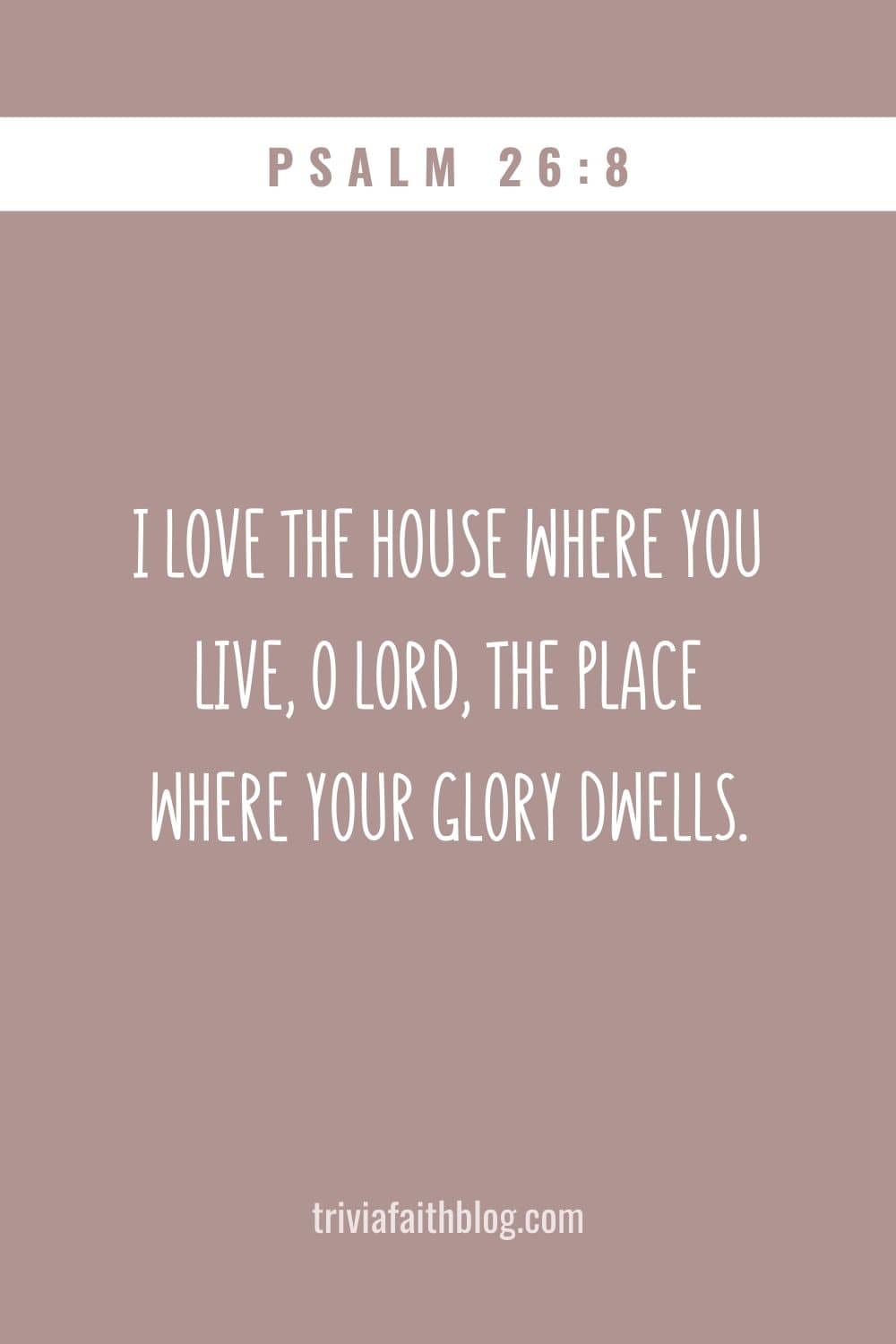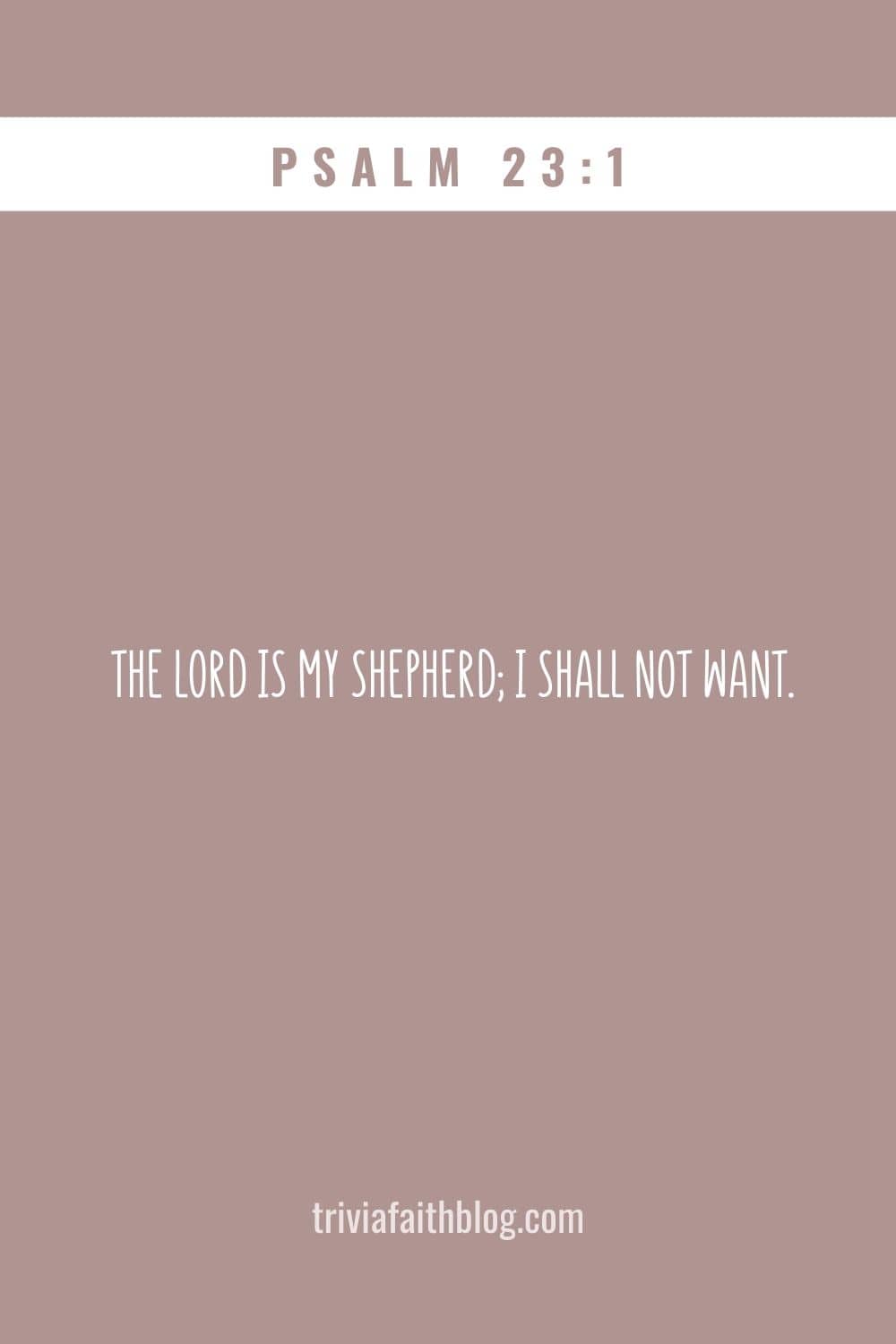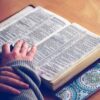Psalm 23 Meaning – The Lord Is My Shepherd, I Shall Not Want
In this post, we will delve into the commentary on Psalm 23, reviewing each verse by verse to shed more light on this beautiful Psalm.
We will also talk about Psalm 23 Meaning – “The Lord Is My Shepherd, I Shall Not Want”. The words of this Psalm resonate deeply, reminding us of our status as a child of God under His care.
See also: Psalms 42:1 As The Deer Pants For The Water
This psalm is an iconic part of the Old Testament, written by King David. The sentiments expressed within are as relevant today as they were in Bible times.

What Is Psalm 23?
Psalm 23 offers powerful lessons for us today, reminding us that the Lord is our shepherd who cares about us, protects us, provides for us, and leads us in all aspects of our lives.
David, the author of this psalm, experienced firsthand the loving care of God as he faced many challenges and trials in his life.
Before we proceed, lets reflect and meditate once again what this psalm is all about:
A Psalm Of David
- The Lord is my shepherd, I lack nothing.
- He makes me lie down in green pastures, he leads me beside quiet waters,
- he refreshes my soul, He guides me along the right paths for his name’s sake.
- Even though I walk through the darkest valley, I will fear no evil, for you are with me; your rod and your staff, they comfort me.
- You prepare a table before me in the presence of my enemies. You anoint my head with oil; my cup overflows.
- Surely your goodness and love will follow me all the days of my life, and I will dwell in the house of the Lord forever.
Psalm 23 Meaning
The Lord is My Shepherd, I Shall Not Want
David, as a child of God, acknowledges with certainty in the opening of the 23rd Psalm, “The Lord is my shepherd, I shall not want.” This is a profound statement of faith, demonstrating David’s trust that God, the good shepherd, will meet all his needs.
No matter the circumstance, God is his shepherd and will never let him go astray. This phrase ought to resonate with us not only in challenging times but also in days of joy and abundance.
He Maketh Me to Lie Down in Green Pastures
As we go through life, we may feel as though we’re trapped in a dark tunnel with no end in sight. However, the Psalmist provides reassurance, as David says that the great shepherd leads him to lie down in green pastures, symbolizing growth, life, and peace. Trust in God, and He will guide you to your own ‘green pastures’.
He Leadeth Me Beside the Still Waters
David speaks of ‘still waters’ in the Psalm, signifying peace, calmness, and rest. It is a place where we find spiritual rest and peace that the Lord, our Shepherd, provides for us. Even in the midst of chaos, the shepherd provides tranquility and serenity for his flock. By accepting God as our shepherd, we can find that same peace.
He Restoreth My Soul
“He restoreth my soul” is a profoundly comforting declaration from the psalmist. The term “restoreth” in this context carries the connotation of renewing or reviving, and the “soul” can be seen as the essence of a person – their mind, will, and emotions.
When life’s trials leave us feeling emotionally depleted or spiritually drained, let’s turn to the word of God to revitalize our spirit, imbuing us with renewed strength, hope, and vigor. It is a beautiful illustration of God’s nurturing care for us, His flock, affirming His role as a source of sustenance and restorative peace.
He Leadeth Me in the Paths of Righteousness, For His Name’s Sake
This verse “He leads me in paths of righteousness for his name’s sake” by the psalmist reinforces God as his moral compass. He steers us towards actions and decisions that align with His will, even when we are tempted by worldly distractions.
Everything God does is for the sake of His name. He doesn’t act for His own benefit, but for the honor of His holy name.
Yea, Though I Walk Through the Valley of the Shadow of Death, I will Fear no Evil
David’s declaration, “Yea, though I walk through the valley of the shadow of death, I will fear no evil,” encapsulates his undying faith and resilience. The phrase “valley of the shadow of death” refers to situations of intense fear, adversity, or danger.
However, David remains unafraid, indicating his profound trust in God. His confidence stems from the conviction that God is always with him, providing guidance and protection, making the evils of the most terrifying valley powerless against him. This profound message encourages us to face life’s trials fearlessly, trusting in God’s enduring presence and protection.
For Thou Art with Me; Thy Rod and Thy Staff They Comfort Me
David acknowledges God’s comforting presence in the line “Thou art with me; Thy rod and Thy staff they comfort me” from Psalm 23. These words depict God’s assurance of protection and guidance in times of danger or uncertainty.
The “rod” symbolizes God’s discipline, often used to correct the path of the wandering, while the “staff” is a tool of guidance and support, underscoring God’s role as our Good Shepherd.
This conveys a dual message – that God both corrects and guides us, leading us back when we stray. His discipline and guidance aren’t punitive, but comforting – a testament to His loving care for us.
Thou Preparest a Table Before Me in the Presence of Mine Enemies
In Psalm 23, “Thou preparest a table before me in the presence of mine enemies” speaks to David’s deep faith in God’s protection and provision. This statement, rooted in ancient hospitality customs, indicates God provides not just food and shelter, but also protection against harm.
David signifies his belief that even amidst adversity and danger, God’s care and provision are steadfast. Despite the surrounding threats, God supplies nourishment, protection, and honor, reflecting the depth of His care for us, beyond just physical needs.
Thou Anointest My Head with Oil
David declares, “Thou anointest my head with oil.” In biblical times, shepherds used oil to soothe and heal the scrapes or wounds that sheep might get from thorny bushes or rough terrain. This oil was also a deterrent for parasites that could harm the sheep.
Symbolically, David is illustrating how the Lord cares for him, and us, providing protection, healing, and favor. God anoints His children with His love, grace, and blessings, always ready to restore and renew us when we stumble or fall.
My Cup Overflows
A cup often symbolizes our life – what we have, who we are, and what we experience. An overflowing cup indicates abundance, that we are filled to the brim and beyond with blessings. It’s a vivid illustration of God’s abundant generosity, reflecting His immeasurable love and grace.
God’s provisions aren’t just sufficient; they exceed our needs, as He continues to fill our lives with blessings and opportunities, creating an overflow of His goodness in our lives.
Surely Goodness and Mercy Shall Follow Me All the Days of My Life
The phrase “Surely goodness and mercy shall follow me all the days of my life” is David’s heartfelt expression of optimism and faith. The term “follow” in the original Hebrew word is much more active than the English translation implies. It’s closer to “pursue” or “chase”.
Hence, David was not simply suggesting that goodness and mercy would accompany him, but they would actively seek him out throughout his life. It is a resounding testimony of his unwavering belief in God’s constant love, grace, and faithfulness.
This powerful assertion is a reminder for us that God’s goodness and mercy are not passive elements of our lives, but active, dynamic forces that pursue us every day.
And I Will Dwell in the House of the Lord Forever
David concludes the Psalm with the statement, “And we shall dwell in the house of the Lord forever.” This declaration is more than just a statement of faith; it’s a testament to his absolute trust and certainty in God’s promise of eternal life.
To ‘dwell in the house of the Lord forever’ implies a permanent, unending relationship with God that extends beyond our earthly existence.
David’s words reflect the deep intimacy and security he feels in his relationship with the Father, promising that we too, as God’s children, can look forward to an eternal dwelling place in God’s house, basking in His love and presence eternally.
What are the three main points of the Psalm 23?
Psalm 23, often referred to as the “Shepherd Psalm,” is one of the most well-known and frequently recited Psalms in the Bible. The three primary themes or points of this psalm can be summarized as follows:
- God as a Provider: The Psalmist describes God as one who provides for his people, leading them “beside still waters” and making them lie down in “green pastures”. This represents God’s caring nature and His ability to provide rest, sustenance, and peace.
- God as a Protector: God is our guidance and protector during life’s most challenging times. The Psalmist makes it clear that we should not be afraid, because God’s presence, symbolized by the rod and staff, offers comfort and security.
- God as a Benevolent Host: The latter part of the verse describes God as a gracious host. God prepares a table before us in the presence of our enemies which describes Him as a caring father.
These three key points collectively portray a picture of trust in God’s provision, protection, and abundant kindness.
Daily Readings and Meditation
- John 10:27 – “My sheep hear My voice, and I know them, and they follow Me.”
- Psalm 100:3 – “We are His people, and the sheep of His pasture”
- John 10:11 – “I am the good shepherd: the good shepherd giveth his life for the sheep.”

Final Thoughts
The 23rd Psalm paints a comforting image of God as our Shepherd. This relationship between the Shepherd and His sheep is personal and intimate. It’s a reminder that we are under the watchful eye and loving care of the Shepherd who knows us by name.
The phrase “I shall not want” is a profound statement of trust in the Lord’s provision. It’s a promise of not just physical provision but also spiritual fulfillment.
The Shepherd’s rod and staff symbolize His protection and guidance. Just as a shepherd directs and defends his sheep, so does God with us. Even when we walk through the valley of the shadow of death, it is not a sword of destruction, but one that carves a path through our fears and trials. We are assured that even in our darkest moments, our Shepherd is with us.
The bond between the Shepherd and His sheep is deepened by recognizing His voice and following Him. It’s through listening and obeying that we build our trust in Him. The Shepherd’s ultimate demonstration of love is that He gave His life for His sheep, embodying the sacrificial love of Jesus Christ.
Psalm 23 serves as a reminder of these promises, filling us with hope and faith, secure in the knowledge that we will dwell in the house of the Lord forever.
FAQ On Psalm 23
Pin This!






